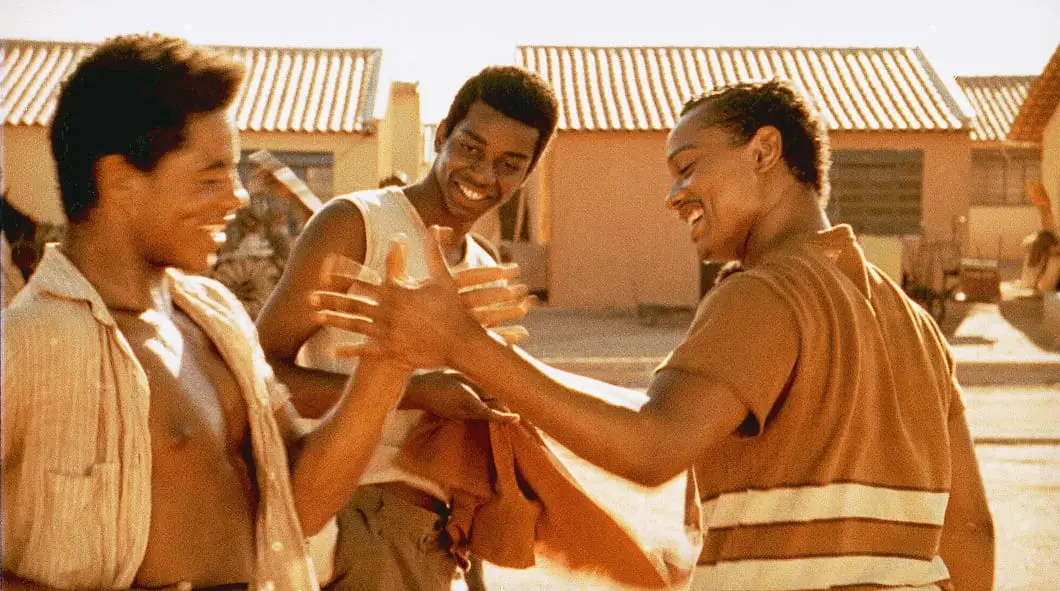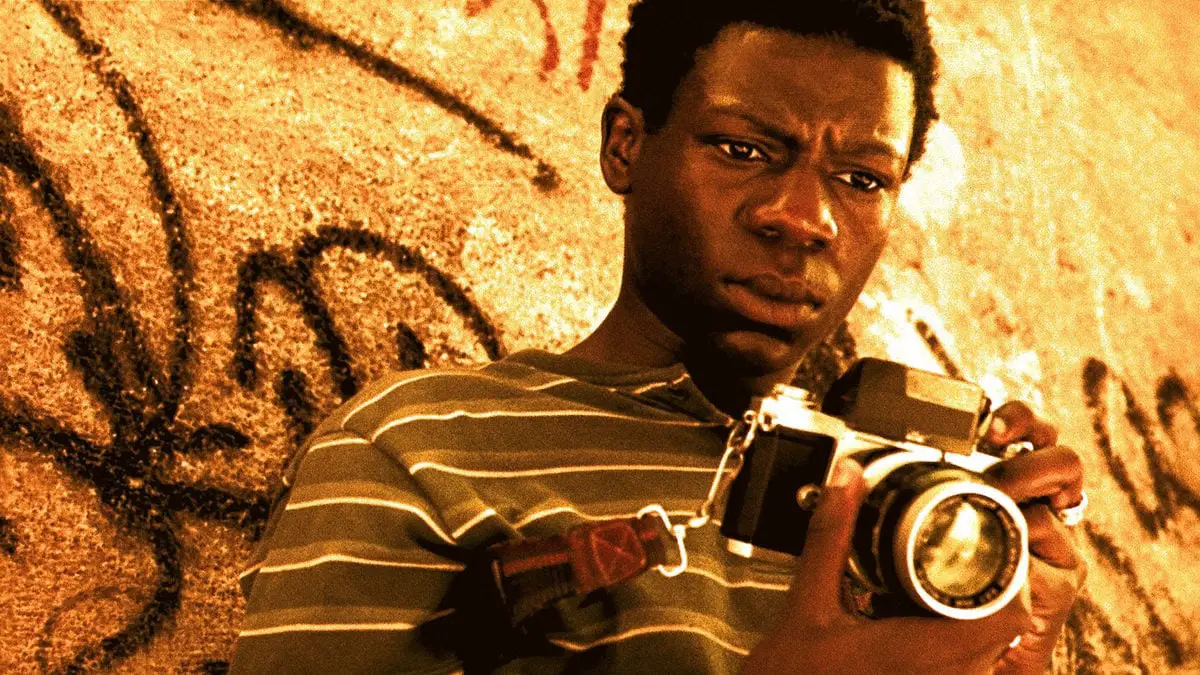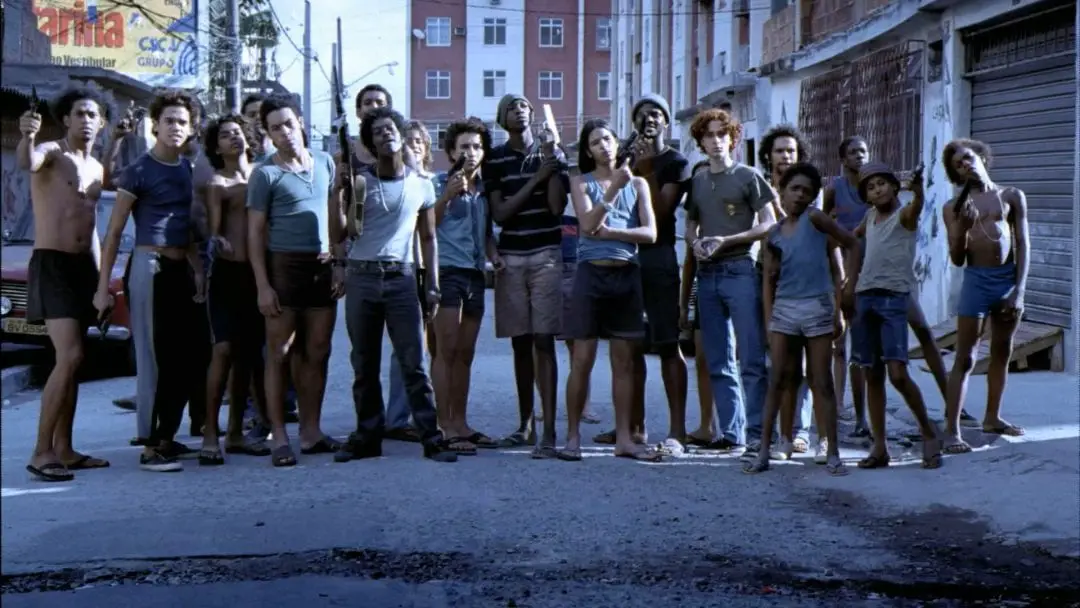In 2002, the Brazilian film City of God released to critical acclaim, and it was deserved acclaim, as it is a beautiful portrayal of tough times in a hard place, but a place that is filled with as much joy as it is with criminality. The stunning film adaptation of Paulo Lin’s 1997 book of the same name was brought to the screen by Fernando Meirelles and Katia Lund. The events of the story are loosely based around true events that took place in the favelas of the City of God over a 20 year period. It begins with the favelas origins and how they started off back in the 60s as a small housing development with little to no resources, to its eventual free–fall into a crime–ridden warzone. However, as Rocket would say, it is not time to tell that story yet.
To tell the story of the fall of the favelas, you first have to focus on the origins of the criminality within the impoverished projects. A perfect example of these origins is the Tender Trio, the hoodlum gang of small–time criminals that go by the names of Shaggy, Clipper, and Rocket’s older brother Goose. Just like the rest of the inhabitants of the favela, the trio was shuffled off to one side by the metropolitan elite, and left to resort to any means necessary to survive. The level of notoriety that the Tender Trio had and the small–time nature of their crimes was a portent for what was to come for the favela.
The status they held within their neighborhood was a sign of the nature of the type of action that would be rewarded by the community, beginning a cycle of crime and violence that would later engulf the favela. Their misguided actions would later lead to a mass shooting at a motel which was another omen for the escalation in violence. Their stories would culminate in very different ways after the events at the motel. This was an excellent piece of storytelling by Meirelles and Lund. I love it when directors use a small piece of their narrative as a microcosm for the environment that the characters call home.

They use the divergent paths of the trio to show that if you don’t leave the life of crime, the only way out is death, as seen by the end to Goose and Shaggy’s stories—who were both gunned down—the only one of the trio that survived the aftermath of the events at the motel was Clipper, who returned to the church. The end of the trio saw the end of the of an era, as it saw the small–time crime replaced by an ever–growing drug trade that went hand in hand with the aforementioned escalation in violence. The trio was replaced with a new breed of criminal, the new would–be rulers in the favela, Goose’s assassin Li’l Dice and his long time accomplice Benny.
The two upstarts were bathed in blood from a young age, especially Li’l Dice who later goes by the moniker Li’l Ze. He is the perfect case study of what happens to someone who grows up on the streets, knowing nothing but violence, and how desensitized they become from living this type of lifestyle from such a young age. Just like child soldiers, they see and know no other way, and for many, once they start a life of crime, it consumes their lives for their short duration, with few exceptions. One such exception would be City of God’s protagonist Rocket.
Rocket veered away from the life of crime, even though he did have a brush with it, showing how desperate he was, even though he showed his true nature by not following through with his ill-fated plans, to at first rob a bus, then later a restaurant. Rocket’s flirtation with the criminal lifestyle just shows that at any moment even a straight-arrow like Rocket could have ended up on the wrong side of the law. Luckily for Rocket, his destiny would not lay in the criminal underworld. Instead, he would become the one journalistic photographer that would be able to chronicle the events of the gang war that rocked his home during the 1980s.
Before the violence was at its pinnacle in the 80s, the transformation of the favela from small housing development into a sprawling urban landscape had begun the previous decade. In the 70s there is a clear sign of the American hippie culture starting to take hold in the favela. Rocket and friends espouse notions of peace and love, they smoke pot, and sprawl out on the sandy beaches. This would be a far cry from the following decade. With the 80s came the arrival of the sambo inspired disco era, paired with the uptick in the narcotics trade and the scale of the violence in the City of God.

Rocket’s journey is an interesting one. So many times throughout his story there is a character that runs parallel to him but takes a very different route than he does. At first, it was Li’l Dice, then it was Thiago. Both characters were Rocket’s peers at different stages of his life, and when he veered towards a more legitimate lifestyle, they veered towards a life of crime. This is another opportunity that Meirelles and Lund take to show how it could have been different for Rocket. He could have so easily ended up on the wrong side of the law, and how life is filled with small moments that have a much larger consequence. Rocket’s life was no different.
These small moments and the reaction to them are perfectly encapsulated in Rocket’s relationship with Thiago’s girlfriend Angelica. Rocket pursues and eventually wins Angelica’s heart, this leads to Thiago resorting to a life of crime to feed his ever–worsening cocaine habit. Unfortunately for Rocket, it would not be long before the shoe was on the other foot and Angelica would be swooned by the drug dealing Benny, who had just undergone his transformation into a playboy—to use Benny’s words—under the guidance of Thiago.
Rocket’s reaction to losing Angelica was totally polar opposite to Thiago. Instead of spiraling with the loss of Angelica, he focused on his other life’s passion, that being photography. This prevented Rocket from once again flirting with a life of crime. It propelled him in another direction altogether, and even though he will court the criminal world, it will be in a different way. Just like so many people that call the City of God home, this is the thin line that Rocket will walk for most of his journey through the crime–ridden favela.

Another perfect example of this walk along that thinnest of lines is the story of Knockout Ned, the one time vigilante turned criminal, shows how this type of environment can take its toll even on the best of people. After his girlfriend is raped and his family massacred by Li’l Ze, the former veteran saw no other direction to turn than into the open arms of Carrott; Li’l Ze’s rival in the ongoing drug war. Knockout Ned starts with the best of intentions but later becomes the epitome of the nature of the tit for tat violence that plagued the favela. Ned’s quest for revenge unravels as he descends further into the criminal world and his aversion to the loss of innocent life quickly evaporates.
Knockout Ned’s actions are undoubtedly immoral, but he too is a victim of the system that failed him. If it wasn’t for the crimes that had been transgressed upon him, Ned would not have entered the drug war. He was another innocent bystander that got caught up in the chaotic whirlwind and his life was also claimed by it. Ned’s story and his demise is just another path that Rocket could have so easily walked down. These stories that unfold around Rocket are the constant reminder to us every bit as much as they are to him, that in a place like the City of God, life can quickly take a turn and morph into something else entirely.
Luckily enough for Rocket, his life would morph into something better, and he would be able to escape the abject poverty of the favelas, but not many were as fortunate as City of God’s protagonist. When City of God comes to a close, Meirelles and Lund give us a glimpse through the window of what the future holds for the favela. There is a happy ending for Rocket, but not for many of the other inhabitants of the City of God. Li’l Ze is shaken down by the corrupt police force before being executed by his gang The Runts, in an act of retribution for a killing he had ordered earlier in the piece. This was a perfect climax to a story like City of God. Even in its conclusion Meirelles and Lund took the opportunity to remind us that while the cameras stop rolling, this cycle of violence will not be stopping any time soon.




